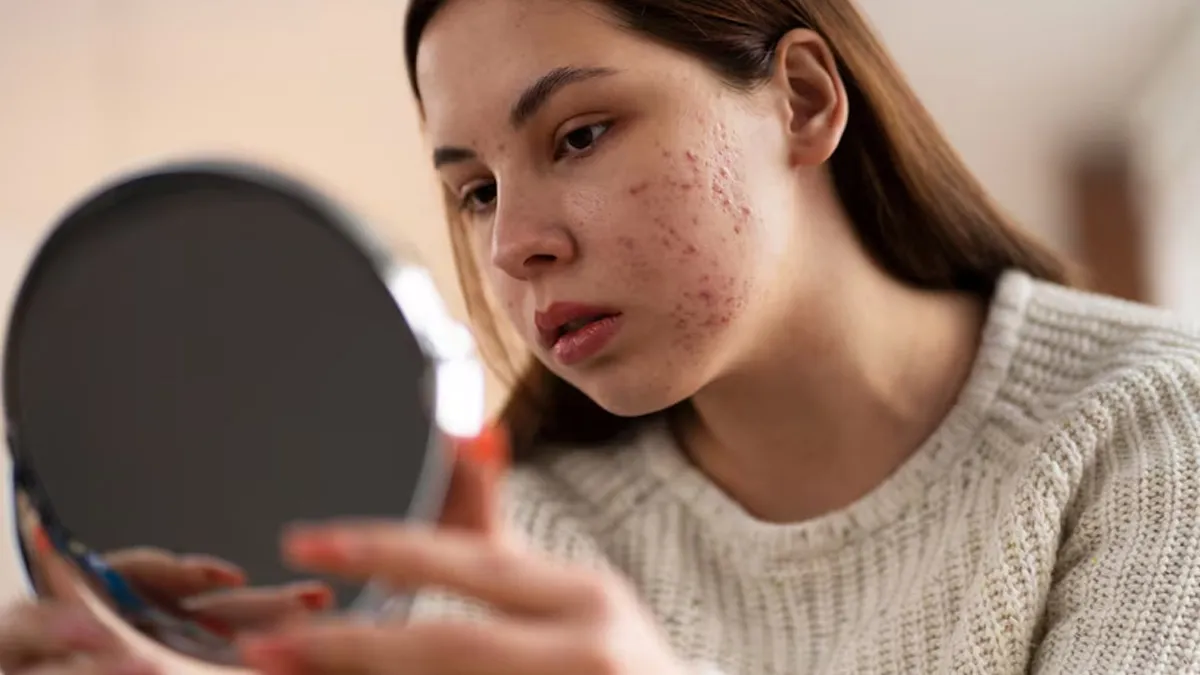
Pregnancy is a lovely experience, yet it can be overwhelming for a lot of reasons. But let's face it, the issues do not end post-delivery. Along with the endless amounts of love and baby snuggles, it may also introduce some unexpected visitors in the form of post-pregnancy skin issues on the face! This hormonal rollercoaster ride might mean wakeful nights, and just the demands of motherhood in general can leave your complexion far from its glowing best.
Table of Content:-
If you are a new mom, don't worry anymore! Although these skin issues are extremely prevalent, they're also transient and controllable. We exclusively spoke to our expert, Dr Sanjeev Gulati, Department of Dermatology, Sharda Hospital - Noida, and he shared some knowledge and the protocol you can get your pre-pregnancy sheen back and feel good in your skin once more.
Tips To Deal With Facial Skin Problems After Pregnancy
Below are a few post-pregnancy facial skin complaints and useful tips on how to tackle them:
1. The Melasma Enigma (aka "The Mask of Pregnancy")
These are the annoying brown or grayish-brown spots that tend to show up on the forehead, cheeks, bridge of the nose, and upper lip are called melasma. Triggered by pregnancy hormone-induced increased melanin production, it can be one of the most vexing post-pregnancy skin issues.
Tips to cope with it:
- Sun Protection is Key: This is your best defence! UV exposure dramatically exacerbates melasma.
- Use Sunscreen: Wear a broad-spectrum sunscreen with at least SPF 30 daily, even indoors or on cloudy days. Reapply every two hours, or more frequently if sweating or swimming.
- Gentle Skincare: Do not use harsh exfoliants or irritating ingredients that can cause inflammation and exacerbate pigmentation.
- Topical Treatments (See Your Dermatologist): After you have weaned, your physician may suggest topical creams with products such as hydroquinone, retinoids, azelaic acid, or vitamin C.
- Patience is Key: Melasma will often resolve spontaneously over months after childbirth, particularly with consistent sun protection.
Also Read: Nita Ambani’s Ageless Beauty Secrets at 61, Know How She Looks Younger Every Year With Glowing Skin

2. Post-Pregnancy Acne Breakouts
Just when you thought you were finished with hormonal changes, your skin may have other plans! Changing hormone levels, higher oil production, and stress can all lead to new breakouts or a return of old acne.
Tips to cope with it:
- Cleanse Gently: Wash your face twice a day with a gentle, non-comedogenic cleanser. Steer clear of over-washing, which strips your skin and ironically causes more oil production.
- Search for Safe Ingredients: If breastfeeding, pay attention to what you're applying to your skin.
- Use Actives: Salicylic acid (in low concentrations, usually 2% or less, and applied sparingly to a small area) and benzoyl peroxide are usually safe for use on the skin while breastfeeding, but check with your doctor first. Glycolic acid may be beneficial as well.
- Hydrate: Don't skip moisturiser, even if your skin is oily. Dry skin can overproduce oil to make up for it. Choose a lightweight, oil-free, non-comedogenic moisturiser.
- Avoid Picking: This only makes things worse and can cause scarring.
- Manage Stress: Easier said than done with a new baby, but taking time for oneself can keep stress breakouts in check.
3. Dry, Dull, or Sensitive Skin
Hormonal shifts, dehydration, and the sheer exhaustion of new parenthood can leave your skin feeling dry, tight, and lacking its usual radiance. Some women also experience increased sensitivity.
Tips to deal with it:
- Moisturise Religiously: Apply a rich, nourishing moisturiser morning and night, and throughout the day if needed. Look for ingredients like hyaluronic acid, ceramides, and glycerin.
- Gentle Cleansing: Opt for hydrating, soap-free cleansers.
- Stay Hydrated from the Inside Out: Drink lots of water during the day. This is essential for healthy skin, particularly if you are breastfeeding.
- Humidifier Relief: If you have a dry environment where you live, using a humidifier can put moisture into the air and help your skin.
- Skip the Hot Showers: Hot water can strip away your skin's natural oils. Use lukewarm water.

4. Under-Eye Circles and Puffiness
What it is: Lack of sleep is practically a rite of passage for new parents. Added to fluid retention and looser skin around the eyes, this can result in puffiness and dark circles.
Tips to cope with it:
- Sleep When You Can: This is the ultimate solution. Nap during the time your baby naps, and don't hesitate to request assistance with nighttime feedings.
- Raise Your Head: Sleeping with a raised head can decrease fluid accumulation around the eyes.
- Cool Compresses: Cold slices of cucumber, tea bags (caffeinated or chamomile), or an eye mask that is cool can narrow blood vessels and decrease puffiness.
- Hydrating Eye Cream: For eye creams with ingredients such as caffeine (to tighten blood vessels), hyaluronic acid (for moisture), and vitamin C (for lightening).
- Gentle Massage: Gently tap under the eyes to stimulate lymphatic drainage.
Bottomline
Keep in mind that every woman's journey to motherhood is different, and so is yours. So is the journey of your skin. Accept the changes, be diligent with your self-care, and rest assured that with a little TLC, your skin will be headed in the direction of its gorgeous, healthy self in no time.
[Consult a Dermatologist: In case your skin issues are severe, chronic, or disturbing you, do not delay visiting a dermatologist. They can provide individual advice and prescribe more potent treatments if necessary, considering your breastfeeding status.]
Also watch this video
How we keep this article up to date:
We work with experts and keep a close eye on the latest in health and wellness. Whenever there is a new research or helpful information, we update our articles with accurate and useful advice.
Current Version